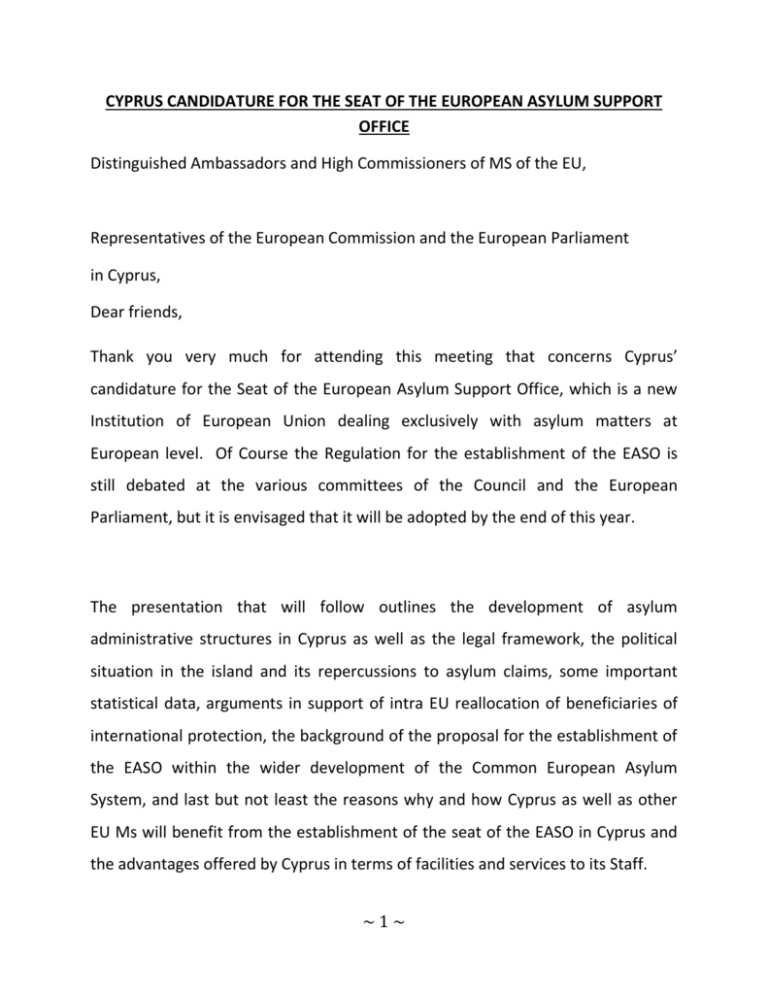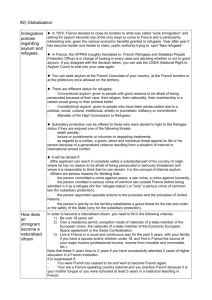omilia
advertisement

CYPRUS CANDIDATURE FOR THE SEAT OF THE EUROPEAN ASYLUM SUPPORT OFFICE Distinguished Ambassadors and High Commissioners of MS of the EU, Representatives of the European Commission and the European Parliament in Cyprus, Dear friends, Thank you very much for attending this meeting that concerns Cyprus’ candidature for the Seat of the European Asylum Support Office, which is a new Institution of European Union dealing exclusively with asylum matters at European level. Of Course the Regulation for the establishment of the EASO is still debated at the various committees of the Council and the European Parliament, but it is envisaged that it will be adopted by the end of this year. The presentation that will follow outlines the development of asylum administrative structures in Cyprus as well as the legal framework, the political situation in the island and its repercussions to asylum claims, some important statistical data, arguments in support of intra EU reallocation of beneficiaries of international protection, the background of the proposal for the establishment of the EASO within the wider development of the Common European Asylum System, and last but not least the reasons why and how Cyprus as well as other EU Ms will benefit from the establishment of the seat of the EASO in Cyprus and the advantages offered by Cyprus in terms of facilities and services to its Staff. ~1~ In 2000 the Cyprus Refugee Law was enacted and in 2002 the Refugee Authority was established. The Asylum Service of the Ministry of the Interior replaced the Refugee Authority in 2004. That same year, the Refugee Reviewing Authority was also established. The Refugee Law 2000-2007 establishes the provisions regarding the examination of asylum applications and the granting of international protection. The legal framework is also bound by the European acquis which consists of EU Directives and Regulations and also the Decisions of the European Court of Human Rights and the European Court of Justice. Moreover, the legal framework is also based and bound by International Conventions and Treaties, such as the Geneva Convention of 1951 and the 1967 Protocol. The Cyprus Refugee Law was amended in 2002, 2003, 2004, 2005 and 2007 in order to transpose the European acquis. The EU Directives transposed into the Cyprus Refugee Law are the following: 1. DIRECTIVE 2003/9/EC OF THE COUNCIL LAYING DOWN MINIMUM STANDARDS FOR THE RECEPTION OF ASYLUM SEEKERS (CURRENTLY THERE IS A NEW PROPOSAL BY THE COUNCIL AND THE EU PARLIAMENT FOR AMENDMENT) 2. DIRECTIVE 2003/86/ΕC OF THE COUNCIL REGARDING FAMILY REUNIFICATION 3. COUNCIL REGULATION 343/2003 ESTABLISHING THE CRITERIA AND MECHANISMS FOR DETERMINING THE MEMBER STATE RESPONSIBLE FOR EXAMINING AND APPLICATION FOR INTERNATIONAL PROTECTION (CURRENTLY THERE IS A NEW PROPOSAL BY THE COUNCIL AND THE EU PARLIAMENT FOR AMENDMENT) [DUBLIN] 4. COUNCIL REGULATION 343/2003 FOR THE ESTABLISHMENT OF EURODAC, TO FACILITATE THE APPLICATION OF THE DUBLIN CONVENTION (CURRENTLY THERE IS A NEW PROPOSAL BY THE COUNCIL AND THE EU PARLIAMENT FOR AMENDMENT) 5. DIRECTIVE 2004/83/EC OF THE COUNCIL ON MINIMUM STANDARDS FOR THE QUALIFICATION AND STATUS OF THIRD COUNTRY NATIONALS OR STATELESS ~2~ PERSONS AS REFUGEES OR AS PERSONS WHO OTHERWISE NEED INTERNATIONAL PROTECTION AND THE CONTENT OF THE PROTECTION GRANTED 6. COUNCIL DIRECTIVE 2005/85/EC, ON MINIMUM STANDARDS ON PROCEDURES IN MEMBER STATES FOR GRANTING AND WITHDRAWING REFUGEE STATUS (ENACTMENT OF NATIONAL AMENDMENT LAW PENDING) The Political Situation in Cyprus and its repercussions to Asylum Claims Apart from its proximity to crisis regions, the problem for Cyprus is intensified due to the specific situation faced by the Government of the Republic of Cyprus, as it continues to be deprived of the possibility to effectively control the part of its territory which remains under illegal military occupation by Turkey. While Cyprus has joined the EU as a whole, the Government of the Republic of Cyprus exercises effective control up to the Green Line (which divides Turkish occupied areas from the areas controlled by the Government of the Republic of Cyprus) while the application of the acquis north of the Green Line has been suspended in accordance with Protocol No. 10 to the Act of Accession 2003. 99% of persons, who illegally enter the areas controlled by the Republic, originally enter Cyprus from the occupied territory and then pass to the areas controlled by the Republic, by crossing the green line. 60% of the asylum applications concern persons who enter the areas controlled by the Republic, via occupied territories. The great majority of the illegal immigrants apprehended in the Government controlled areas come from Turkey through the areas that are not under the effective control of the Government of the Republic of Cyprus. Also illegal immigrants arrive directly to the occupied areas by boats and speed boats. Based on information gathered by the Cyprus Police, as well as testimonies given by apprehended illegal immigrants they arrive in the occupied areas either by plane through the illegal airport at Tymbou or by illegal ferry lines from Turkey and Syria. (All operating ports in the occupied part of the island were declared by the Government as closed to international traffic in 1974) ~3~ Images of visas issued to third country nationals by the Turkish Authorities which specifically state that the bearer is entitled to enter the so called “Turkish Republic of Northern Cyprus” as well as Turkey Map which shows the main routes of illegal immigrants and asylum seekers, to Cyprus via Turkey The Demographic Situation in Cyprus is the following: The total population of the government controlled areas as officially recorded on 01.01.2008, is 795,000, whereas the estimated number for Turkish Cypriots residing in the areas not effectively controlled by the Republic of Cyprus, is 88,900. The number of third-country nationals holding a valid residence or work permit, according to official figures of 14.10.2009, is 69,645, whereas the number of EU Nationals residing in the Republic, is 83,387 The National Asylum statistical data of 2002 up to 31.08.2009 as shown in the graphs are analyzed in detail in the following categories: Applications: 40260 Decisions: 37408 Refugee status: 241 Subsidiary protection status and humanitarian: 1283 Rejected and Closed files: 36027 Pending for decision: 1711 I would now briefly like to present the situation with regards to asylum in the EU5 Mediterranean States that is, Spain, Italy, Malta, Greece and Cyprus Since 2006, the group of EU5MED countries has seen an increase in the number of asylum applicants. That number has almost doubled, from around 34,000 to slightly more than 61,000. The share of applications from the EU5MED on the total of applications for the EU27 has increased from 17% to almost 26% between ~4~ 2006 and 2008. Most of the applications are presented in just two of the EU5MED: Italy and Greece. Italy was the second most affected Member State by asylum flows in 2008, right after France, with 31,200 applications. Although the absolute numbers put Italy and Greece as the top countries of destination, in relative terms (compared to the population), Cyprus and Malta are much more affected, with around 41 and 18 applications per 1,000 inhabitants for the period 2004-2008. Of the EU5MED, Spain would appear to be the least affected by asylum flows. The number of applications is comparable with the number for Cyprus, which is a much smaller Member State. As described previously, the situation in the Mediterranean calls for urgent and specific measures for solidarity and burden sharing. One of these measures is the intra EU Reallocation. Reallocation of beneficiaries of international protection between MS is expected to be one of the most important practical measures towards practical solidarity if this is conducted on a fair and proportional basis. At the moment the Commission is implementing a pilot-programme with Malta. The value of this measure has been recognized by the European Council of 18th and 19th June 2009, which through its Conclusions called for a coordination of voluntary measures for internal reallocation of beneficiaries of international protection present in the MS exposed to specific and disproportionate pressures and highly vulnerable persons. As a matter of principle Cyprus and other Mediterranean MS support a more formalized and binding approach to intra-EU reallocation, although we recognize that at present the utmost priority is to start implementing intra-EU reallocation under existing arrangements as early as possible. Such a mechanism would not act as a “pull factor” as some imply simply because there are no guarantees that it will cover all beneficiaries of international protection. ~5~ I will now proceed, with a brief presentation on the background of the proposal for the establishment of EASO, within the wider development of the common European Asylum System. In 1999 the Heads of State and Government meeting in Tampere called for the establishment of a Common European Asylum System. Since then, many legislative measures were adopted at EU level between 1999 and 2005, regulating some aspects of important issues: asylum procedures, reception conditions for asylum-seekers, responsibility for examining an asylum application, qualification to become a refugee, etc. The European Council requested in the Hague Programme further development of the Common European Asylum Policy. As I have already mentioned before, the EASO is part of the wider common European Asylum System and therefore it is important to briefly mention the objectives of this System. 1. Ensure access for those in need of international protection 2. Increase practical cooperation 3. Determine responsibility, promote solidarity and fair burden sharing within the EU and between the EU and third countries In 2007 the Commission presented a Green Paper to launch a debate with all relevant actors about the form the CEAS should take. Input received during this debate contributed to the preparation of the Policy Plan Before reaching the proposal for the EASO a policy plan was submitted. The purpose of the policy plan was to present all initiatives the Commission plans to make in the period 2008-2010, in order to complete the second phase of the Common European Asylum System. The proposal for a Regulation to establish a European Asylum Support Office was adopted by the Commission on the 18th of February 2009 and it is part of the acquis on the Common European Asylum System. ~6~ This proposal is presented in the European Pact on Immigration and Asylum in response to a request by the European Council and within the framework of the Policy Plan on Asylum adopted by the Commission in June 2008. If the proposal is adopted by the end of 2009, the Office could be up and running within 2010. Much progress has been made in recent years, as mentioned before, towards the establishment of the Common European Asylum System thanks to the implementation of common minimum standards. However, there are great disparities, which should be reduced, between one Member State and another in the granting of protection and the forms that protection takes. Practical cooperation on asylum aims to increase the convergence of Member States’ decision making procedures on asylum matters within the European legislative framework. A substantial number of practical cooperation measures have already been undertaken in recent years, notably the adoption of a common approach to Country-of-origin information and the establishment of a Common European Asylum Curriculum. For ms which are faced with specific and disproportionate pressures on their national asylum systems and reception systems, due in particular to their geographical or demographic situation, the office should support the implementation of solidarity mechanisms inter alia to promote, on a voluntary and coordinated basis, a better relocation of beneficiaries of international protection from such ms to others, while ensuring that asylum and reception systems are not abused. The Office should work in close cooperation with the competent authorities of the Member States and with UNHCR. The Office’s terms of reference should be focused on three major tasks, namely contributing to the implementation of the Common European Asylum System, supporting practical cooperation among Member States on asylum and supporting Member States subject to particular pressure. ~7~ The Structure of the EASO consists of the Management Board, the Executive Director and also the Working Parties and the Consultative Forum. The functions of the EASO are as follows: To strengthen practical cooperation among ms and to provide and/or coordinate the provision of operational support to ms subject to particular pressure on their asylum and reception systems To provide scientific and technical assistance for community policy-making and legislation as an independent source of information To organise, promote and coordinate activities enabling the exchanging of information and the identifying and pooling of good practice among ms To organise, promote and coordinate activities relating to information on countries of origin For ms which are faced with specific and disproportionate pressures on their asylum & reception systems, due in particular to their geographical or demographic situation, the office shall promote, facilitate & coordinate exchanges of information and other activities related to intra-community transfer (voluntary) for beneficiaries of international protection To develop training available to members of all national administrations & courts & tribunals & national services in MS. To coordinate exchanges of information & other action on the resettlement taken on a voluntary basis by ms and to promoting & assisting capacity-building in third countries & implementing regional protection programmes & other actions To coordinate & support common action assisting asylum & reception systems of ms subject to particular pressure which places exceptionally heavy & urgent demands on their reception facilities & asylum systems. Such pressure may be characterized by the sudden arrival of a large number of third-country nationals ~8~ who may be in need of international protection and may be arising from the geographical or demographical situation of the ms The EASO will coordinate and support Cyprus asylum system which faces particular pressures The EASO will facilitate Cyprus on the initial analysis of asylum applications under examination The EASO will coordinate action in order to ensure that appropriate reception facilities will be made available (emergency accommodation & transport) The EASO will deploy of asylum support teams (technical or operational) in order to deal with disproportionate pressures – burden sharing & solidarity The EASO will assist & coordinate the resettlement programmes of beneficiaries of international protection. One of the most important functions of the EASO will be the coordination of asylum support teams, meaning the deployment to a ms or states subject to particular pressure an asylum support team. The requesting ms or states shall provide in particular a description of the situation, indicate its objectives & specify its estimated deployment requirements & to coordinate the necessary technical & operational assistance, for a limited time, of an asylum support team in the territory of that ms on the basis of an operating plan. Another function is the setting up of a list of interpreters as part of an asylum intervention pool. Why and how Cyprus will benefit from the establishment of the EASO? For Cyprus the establishment of EASO is an issue of priority, given that Cyprus is faced with specific & disproportionate pressures due in particular to its geographic location & political & demographic situation Cyprus is geographically close to countries which produce beneficiaries of international protection due to political instability. ~9~ The majority of asylum seekers arriving from the areas not effectively controlled by the Republic of Cyprus due to the Turkish occupation (ports, cease fire line) The EASO will coordinate and support Cyprus asylum system which faces particular pressures The EASO will facilitate Cyprus on the initial analysis of asylum applications under examination The EASO will coordinate action in order to ensure that appropriate reception facilities will be made available (emergency accommodation & transport) The EASO will deploy asylum support teams (technical or operational) in order to deal with disproportionate pressures – burden sharing & solidarity The EASO will assist & coordinate the resettlement programmes of beneficiaries of international protection. Why and how EU Member States will benefit from the establishment of the EASO in Cyprus? The asylum situation in Cyprus represents a prime example of how EASO mission could benefit the Member States The Cyprus is at the borders of the EU, a Mediterranean Member State, near Middle East & Africa. Therefore the first to receive beneficiaries of international protection before they arrive to the rest of the EU The deployment of experts to unstable regions will be easier from Cyprus due its geographical location. This will benefit the operation of regional protection programmes. Cyprus has traditionally assisted and extended hospitality to people in need of protection, fleeing from crisis areas (e.g. Lebanon, Palestinian territories, Iraq, etc). Why the EU experts will benefit from the establishment of the EASO in Cyprus and which are the facilities and services offered in Cyprus? ~ 10 ~ The EASO experts will be granted with privileges and immunities of diplomats There is an easy air-transport to/from Brussels and to most EU capitals There is also an easy air-transport to the Middle East and Africa Cyprus offers a high level of multilingual, European-oriented schooling Excellent housing facilities for EASO staff Access to high standard medical care Efficient land transport connections High standard of living Advanced telecommunications network and Efficient legal, accounting and banking services [CONCLUSION] Cyprus has been providing its full support to EASO since the early beginning of the discussions to set up such an Office. This has been an issue of priority for us, given the specific and disproportionate pressures on our national asylum system, due to the reasons described during this presentation. We are certain that these pressures will be alleviated with the establishment of EASO and as such we consider EASO as one of the most important measures for implementing solidarity and burden sharing within the EU. In this respect, Cyprus assigns great importance to the Office and looks forward to its establishment. ~ 11 ~ On many occasions I have expressed the position that due to its nature and aims, the Office is most appropriate to be hosted by a Mediterranean Member State and particularly by a new Member State taking in mind the Declaration of Head of States and Governments of 2003 regarding the Seats of new Agencies of the EU. Due to the reasons described during the presentation, we firmly believe that Cyprus fulfills all the criteria set for the hosting of the Seat of the Office. I therefore invite you to inform your capitals about our interest to host the Seat and kindly ask for their support. We have already sent to your capitals a dossier with all technical and general information, which we believe fully justify our candidature. Finally, I would like to express my sincere thanks to all of you for attending this presentation. You are now all invited to lunch where we can continue the discussion. Thank you all! ~ 12 ~




